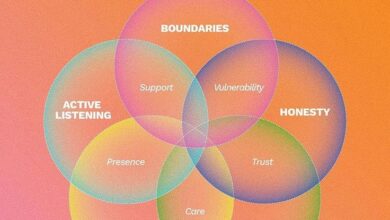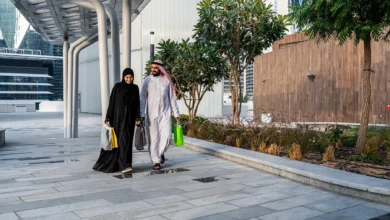Tips for Chatting with Stunning Girls in the Arabian Gulf


Understanding Cultural Etiquette in the Arabian Gulf
Arabian Gulf Cultural Norms and Values
In the Arabian Gulf, people place a strong emphasis on hospitality and respect. It is important to greet others warmly and show genuine interest in their well-being. When interacting with locals, it is essential to maintain a sense of decorum and avoid confrontational behavior. Additionally, modesty in dress and behavior is highly valued in the Arabian Gulf culture, so it is advisable to dress conservatively and avoid public displays of affection.
Appropriate Topics for Conversation
Conversations in the Arabian Gulf are often centered around family, work, and general well-being. It is best to avoid discussing sensitive topics such as politics, religion, and personal finances unless the other party initiates the conversation. Showing interest in local culture, cuisine, and traditions can help foster positive relationships with individuals in the Arabian Gulf region.

Understanding Cultural Etiquette in the Arabian Gulf
Arabian Gulf Cultural Norms and Values
In the Arabian Gulf, there is a strong emphasis on hospitality and respect. It is crucial to greet others warmly and demonstrate genuine interest in their well-being. **Maintaining a sense of decorum and avoiding confrontational behavior is essential when interacting with locals.** Modesty in dress and behavior is highly valued, so dressing conservatively and refraining from public displays of affection is recommended.
Appropriate Topics for Conversation
Conversations often revolve around family, work, and general well-being in the Arabian Gulf. **Avoid discussing sensitive topics like politics, religion, and personal finances unless the other party brings them up.** Showing interest in local culture, cuisine, and traditions can help in building positive relationships in the region.
Dress Code and Presentation
Appropriate Attire in the Arabian Gulf
Grooming and Appearance Tips

Understanding Cultural Etiquette in the Arabian Gulf
Arabian Gulf Cultural Norms and Values
In the Arabian Gulf, there is a strong emphasis on hospitality and respect. Locals appreciate individuals who greet others warmly, show genuine interest in their well-being, and maintain decorum. It is vital to avoid confrontational behavior to ensure smooth interactions. Modesty in both dress and behavior plays a significant role, with dressing conservatively and refraining from public displays of affection being seen as respectful.
Appropriate Topics for Conversation
Conversations in the Arabian Gulf typically center around family, work, and general well-being. Sensitivity is key, so it’s best to steer clear of discussing potentially contentious subjects like politics, religion, and personal finances unless the other party initiates these topics. Demonstrating an interest in the local culture, cuisine, and traditions can foster positive relationships.
Initiating Conversation
Effective Icebreakers
When initiating conversations in the Arabian Gulf, common icebreakers include inquiries about one’s well-being, family, or work. These topics are well-received and help establish a friendly rapport. Compliments on the local culture or hospitality can also serve as effective conversation starters.
Engaging Topics to Discuss
To keep conversations engaging in the region, it’s advisable to delve into topics such as local traditions, cuisine, or upcoming community events. Additionally, sharing experiences from travels or expressing appreciation for the beauty of the region can spark interesting dialogues.

Respectful Communication
Using Polite Language
When interacting in the Arabian Gulf, individuals should prioritize using polite language to show respect and consideration. Simple gestures like saying “please” and “thank you” go a long way in fostering positive communication. Addressing others with honorific titles like “Mr.” or “Mrs.” is also appreciated and demonstrates cultural awareness. Avoiding aggressive or confrontational language ensures that interactions remain cordial and respectful.
Non-verbal Cues and Body Language
In the Arabian Gulf, non-verbal cues and body language play a significant role in communication. Maintaining eye contact while speaking is seen as a sign of attentiveness and respect. Physical gestures should be kept minimal and respectful, avoiding overly expressive movements that may be deemed inappropriate. Additionally, standing too close to others may be considered intrusive, so maintaining a comfortable distance is important in social interactions.

Authentic Interest and Listening
Active Listening Skills
When engaging in communication in the Arabian Gulf, individuals should cultivate active listening skills to demonstrate genuine interest and respect. Active listening involves focusing on the speaker, acknowledging their points, and providing appropriate responses. This helps in fostering meaningful conversations and showing that one values the speaker’s input.
Showing Genuine Interest in the Conversation
It is essential to exhibit genuine interest in the conversation to establish rapport in interactions within the Arabian Gulf cultural context. Asking thoughtful questions, nodding in agreement, and maintaining a positive demeanor express a sincere engagement in the dialogue. Displaying curiosity and attentiveness can enhance communication and contribute to building strong relationships.

Avoiding Controversial Topics
Sensitive Topics to Avoid
When engaging in communication in the Arabian Gulf, individuals should be mindful of sensitive topics to avoid. This includes discussions on politics, religion, and personal finances, which can potentially lead to disagreements or offense. By steering clear of these controversial subjects, individuals can maintain positive and harmonious interactions.
Respecting Cultural Sensitivities
Respecting cultural sensitivities is crucial when communicating in the Arabian Gulf region. This involves understanding and acknowledging the customs, traditions, and values of the local culture. By showing respect for these cultural sensitivities, individuals demonstrate openness, tolerance, and a willingness to adapt their communication style to align with the norms of the region.

Building Rapport and Connection
Establishing a Connection through Shared Interests
Individuals communicating in the Arabian Gulf are encouraged to build rapport by finding common ground through shared interests. This can involve discussions on topics such as traditional cuisine, local arts, or sports. By identifying mutual interests, individuals can establish a connection that fosters a sense of camaraderie and understanding.
Creating a Comfortable Atmosphere
Creating a comfortable atmosphere is essential when engaging in communication in the Arabian Gulf. This involves demonstrating warmth, courtesy, and attentiveness during interactions. By making an effort to establish a welcoming environment, individuals can promote open dialogue and facilitate positive exchanges.

Ending the Conversation Gracefully
Polite Ways to Conclude a Chat
When wrapping up a conversation in the Arabian Gulf, individuals can employ polite phrases to indicate the conclusion of the interaction. Common expressions used to end chats include “Ma’a salama” (goodbye), “Shukran” (thank you), or “Inshallah nosalik” (hopefully, we will meet again). By using these phrases, individuals can signal the end of the conversation with respect and courtesy.
Expressing Appreciation and Gratitude
Expressing appreciation and gratitude is a customary practice when ending a conversation in the Arabian Gulf. Individuals often convey their thanks for the interaction by expressing gratitude for the time spent together. By acknowledging the value of the conversation and expressing appreciation, individuals can leave a positive impression and maintain goodwill.

Ending the Conversation Gracefully
Polite Ways to Conclude a Chat
When wrapping up a conversation in the Arabian Gulf, individuals can employ polite phrases to indicate the conclusion of the interaction. It is common to use expressions like “Ma’a salama” (goodbye), “Shukran” (thank you), or “Inshallah nosalik” (hopefully, we will meet again) to signal the end respectfully.
Expressing Appreciation and Gratitude
Expressing appreciation and gratitude is a customary practice when ending a conversation in the Arabian Gulf. Individuals often convey their thanks for the time spent together, acknowledging the value of the interaction. This practice helps in leaving a positive impression and maintaining goodwill.
Conclusion
Summary of Essential Tips for Chatting with Girls in the Arabian Gulf
| Tip | Description |
|---|---|
| Use polite expressions | Employ phrases like “Ma’a salama”, “Shukran”, and “Inshallah nosalik” to conclude chats respectfully |
| Express gratitude | Show appreciation for the time spent together to leave a positive impression |
Common Pitfalls to Avoid
| Pitfall | Recommendation |
|---|---|
| Abruptly ending conversations | Avoid suddenly cutting off the chat; use polite farewells to end discussions |
| Forgetting to express gratitude | Remember to thank the other person for their time to show appreciation |




